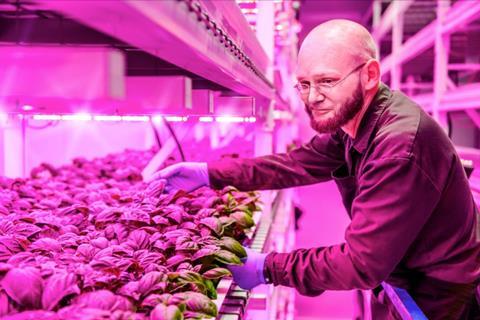
Dutch technology company Philips has revealed it is working with Chicago-based fresh produce grower Green Sense Farms (GSF) to meet growing demand for year-round supply of locally grown fruit and vegetables by developing what it says will be one of the largest indoor commercial farms using LED lights.
According to the group, the innovative farming model will allow the producer to harvest as often as 20-25 times a year by using specifically tailored lighting combinations that provide the optimum spectrum blend for growing a number of different crops, while apparently using 85 per cent less energy.
The result, Philips says, will be an increase in crop yields and a reduction in operating costs, at the same time providing consumers with locally grown, fresh vegetables throughout the year.
With global demand for food rising as suitable land to produce it becomes even more scarce, farmers are said to be finding it increasingly difficult to keep up with urban growth which, according to the UN, will see global population reach 2.5bn by 2050.
That demand has driven innovation in farming technologies that allow plants to grow without sunlight in indoor environments close to or within cities, Philips said, adding that the advent of LED technology had allowed growers to fine-tune the light around crops, ensuring plants received a constant source of illumination and thereby boosting yields.
'Different plant types have different light needs and working with forward thinking growers like GSF, Philips is building up a database of 'light recipes' for different plant varieties,” said Udo van Slooten, director of horticultural lighting at Philips.
'GSF is using vertical hydroponic technology with Philips LED growing lights, enabling them to do what no other grower can do: provide a consistent amount of high quality produce, year round.'
GSF has invested millions of dollars to renovate and equip a million cubic feet of indoor growing space across two climate-controlled rooms, featuring 14 growing towers that use Philips energy-efficient LEDs.
The partners point out that this method eliminates the need for harmful pesticides, fertilisers or preservatives, resulting in produce that is 'organically grown and virtually chemical free'.
Robert Colangelo, founding farmer and president of GSF, said he believed vertical farming could present an exciting future for the produce business largely because of its sustainability.
'Through our joint R&D efforts with Philips, we continue to innovate and perfect LED lighting for indoor growing systems that can maximise plant photosynthesis, while minimising energy use for the most delicious and nutritious vegetables grown in a sustainable manner,' he commented.
'By growing our crops vertically, we are able to pack more plants per acre than we would have in a field farm, which results in more harvests per year. We produce little waste, no agricultural run-off and minimal greenhouse gasses because the food is grown where it is consumed.'
GSF also intends to establish similar farms in places such as college campuses, hospital complexes and military bases that could serve large worker populations, reducing the miles their food travels and improving freshness.



